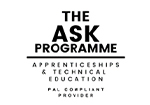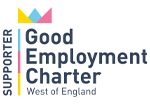Blog

Advice for young entrepreneurs
November 2023
Embarking on the path of entrepreneurship can be a thrilling and rewarding experience and as careers advisers, we support lots of young people in taking their first steps to turn ideas into reality.
If you are considering a move into the world of business, first of all , congratulations are in order! However, we also understand that the journey ahead can be filled with uncertainties, especially when it comes to figuring out the right steps to take and locating valuable information and support.
In this month's blog, we're here to help with advice on getting started, information on the skills you will need and where to find reliable resources to assist you - everything you need to get you up and running.
How to come up with a business idea?
The first step involves identifying your passions and interests, enabling you to select a business idea that closely aligns with what is important to you. By doing this, you will almost certainly experience greater enjoyment in running your business and you should also be able to communicate more authentically with your target audience.
If you are unsure what drives and interests you, there are several very well-known and loved self-assessment tools available to assist you including Morrisby Profile, The Prospects Career Planner and National Careers Service DYSAC tools. These platforms can help to uncover your interests and motivations. They will also provide essential career and labour market information to help you make informed decisions about the industry sector you choose for your entrepreneurial journey.
To get more from your results, you could discuss these with one of our careers advisers and if that would be helpful, you can reach out to us at enquiries@futuresmartcareers.co.uk to arrange an appointment.
What skills will I need?
When you have a business idea, starting your venture will require dedication, perseverance and a willingness to learn from your successes and failures. Working as a sole trader or freelancer it is important to stay motivated, embrace challenges and be alert for spotting opportunities along the way.
Other entrepreneurial skills include planning, organising, time-management, networking and good communicationabilities. Strategic and creative thinking are also important as well as a strong work ethic.
Some of the young people that we meet in careers guidance sessions have a natural entrepreneurial leaning, but you can also develop many of the skills to become a successful young entrepreneur by learning ‘on the job’ as you grow your business. So don’t worry if you don’t know everything before you start. The important thing is to start. There will be ample opportunities for learning along the way.
To find out whether you have an entrepreneurial mindset take a look at Get2test.net. You might also want to consider any additional skills or knowledge required for your chosen business and how you could develop these. You could enrol in relevant courses and online learning platforms such as FutureLearn and Coursera have a large number of micro-skills courses which are perfect for brushing up on some essential business skills in marketing, sales and managing business finances among other areas.
You could also attend workshops, or gain hands-on experience through internships, holiday jobs or other part-time work. If you are under 16, find out about how many hours you can legally work here.
Transferable skills
Also bear in mind that, if you decide not to pursue your startup idea, any entrepreneurial skills that you gain will not be wasted. Many employers favour young people who show initiative and a capacity for independent working, who can identify market opportunities and innovate whilst also being commercially minded. You can find out more what employers are looking for here.
So how do you actually start a business?
Market research: One of the most important things you should do once you have a business idea is research the market to determine if there is a demand for your product or service. You should study your potential customers and also your industry. Some people will investigate their competitors by becoming a mystery shopper.
Image from Freepik
Create your marketing plan: All successful businesses have a good marketing plan to reach their target audience once you have established who your audience are. Most businesses will establish an online presence through a website or social media platforms and sometimes a strong social media presence is the only marketing tool that you will need. Other marketing channels can include paid advertising, content creation or engaging the services of a public relations consultant who can help you to raise awareness of your band and secure coverage in the press.
Product testing: If you are going to sell a product, begin by testing your product or service on a smaller scale before expanding. It is important to gather customer feedback through evaluations and surveys and you should stay connected with customers to thank them when they write a review on your website/social media.
Write a business plan: Fundamental to any new business, a well-thought-out business plan should outline your objectives, your target market, marketing strategies and financial projections. A solid business plan will also help you to stay focused. You can start plotting out your business idea using the Business Model Canvas available on Strategyzer.
Explore funding streams: Some businesses will require start-up funding and this will depend on the scale of your business idea. For example, starting an online business selling clothes will require very little funding, as opposed to a business that requires premises to operate from. If you do need to secure funding, you could explore personal savings, loans, grants, crowdfunding platforms like GoFundMe or funding investors who believe in your vision– be ready to discuss your business plan and be prepared to negotiate!
Register your business: You will need to choose a legal structure for your business such as whether to operate as a sole trader or as a limited liability company and register it with the Gov.uk website. Depending on your business, you may also need certain licences or permits to operate legally too.
Networking: Building a professional network to connect you with other professionals in your field can lead to useful collaborations or even partnerships. If you are over 16, think about building a strong LinkedIn profile and connecting with people who could be key to your business. You could also reach out to new customers and develop potential new business opportunities through online networking or attending local networking events – check out NetworkB2B.
What free resources are there to help me start my business?
Well, there are several excellent websites that can be helpful in different aspects of your entrepreneurial journey and we often share these with students when we explore startup plans with them.
Gov.uk The official UK government website provides a wealth of information for starting and running a business. It offers guidance on business planning, legal requirements, taxation, and more. They also have a support line providing free, impartial advice.
The Princes Trust If you're between 18 and 30 years old, the Prince's Trust can be a valuable resource. They offer support and funding for young entrepreneurs looking to start their businesses.
Start Up Loans This organization provides government-backed loans and mentoring to new businesses in the UK.
British Chamber of Commerce The British Chambers of Commerce (BCC) can provide networking opportunities, business advice, and support through their local chambers across the UK.
Young Enterprise This charity organization helps young people learn about business and entrepreneurs.
South West Enterprise If you are in the South West region, the South West Enterprise Fund are offering grants of up to £2000 from any 18-30 year old starting an enterprise in Gloucestershire.
Meet Up This is another great platform to find local business networking events and meet like-minded people.
The following sites provide in-depth guidance on starting and running a business:
Go for it!
The journey to becoming a young entrepreneur is undoubtedly an exciting and fulfilling one and you are not alone on this journey – there is a vast community of entrepreneurs and support networks ready to help you move forward. The road may be challenging at times, but with dedication, perseverance and the right resources, entrepreneurial dreams can become a successful reality.
And finally, if you would like further careers guidance or support from one of our careers advisers as you embark on your next steps, then please get in touch at enquiries@futuresmarcareers.co.uk to arrange an appointment.
Good luck on your exciting adventure as a young entrepreneur!



 0330 311 9509
0330 311 9509 







